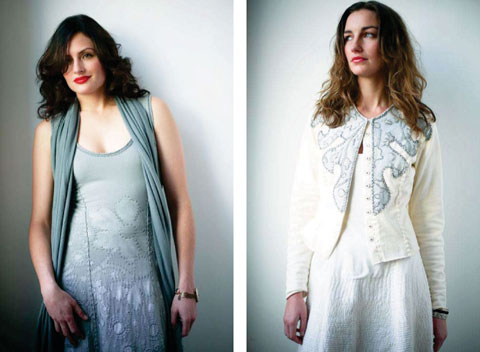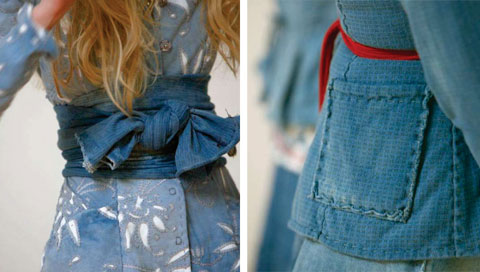After spending twenty years abroad abroad, traveling, living and working as a costume designer, Natalie Chanin returned to her hometown Florence, Alabama with the intention of producing a short documentary focused on stories of the joys and hardships, the friendships and family bonds of a specific time and place, told by traditional quilt-makers from the south. This experience opened Chanin’s eyes to the possibilities and the potential of these skilled artisans — she decided to stick around and start a business.
Upcycling has been a crucial part of your work since you started your first line, Project Alabama. Garments are lovingly well-made and meant to be passed from hand to hand, and generation to generation, a journey that really begins even before the fabric is made (upcycled) into one of your designs. How did it all begin?
The old story of me cutting apart a t-shirt and sewing it back together again (with the seams on the outside) for a party is really the basis of the company I own and run today. I sewed that t-shirt because I wanted something special to wear. What I found out was that it had been a very long time since I had made something with my own two hands. That process of making rather than buying excited me. I got up the next morning and started making another shirt, then the next day another, and the next day another. Those “upcycled” shirts became a t-shirt line, then a collection and today what I would consider to be a lifestyle.

All of the profits from The Alabama Builds Shirt go to benefit Architecture for Humanity in their work with the Gulf Coast Region projects. Natural Organic Cotton and Made in the USA.
Today we work with both 100% certified organic cotton and recycled cotton. The fiber that we use is grown in Texas, spun in Tennessee, knit in South Carolina, dyed in North Carolina and comes to us in Alabama for cutting, painting and sewing. The scraps from the production process are another area where we are constantly looking at ways to upcycle. Cuttings are integrated into one-of-a-kind pieces, home furnishings, and finally bailing (with a homemade pine straw bailer) — everything harks back to the bale of cotton.
All the people that work for you are their own small businesses, which is a total departure from the old factory way of doing things. Did the artisans welcome this right away, or was there some initial skepticism?
All of our artisans welcomed the work immediately. In fact, there was a short period where we tried to move the work to a centralized facility. At that time, we were working with approximately 120 artisans. We called each of the artisans one afternoon and asked them to come to our production office the next morning — of 120, about 12 showed up. This cottage industry method of manufacturing is perfect for single mothers who need to have a flexible schedule, office workers who need an additional income, retired workers who care for elderly parents and others who require a flexible work schedule. By becoming their own business owners, they have the right to work as much as they like, when they like and at the location of their choosing. Makes life easier to manage.

Alabama Chanin garments are made by over 30 skilled local artisans — mothers, brothers, sisters, daughters, husbands, and wives, friends and lovers…
Transparency seems to be one of the major words of the moment here in America. You have been sharing your patterns, selling the materials, basically been making all the resources available for people to recreate your designs. This goes against any wisdom of “conventional” business, but you make the point that it actually helps your business. How is that?
All of the pieces and parts of my business make the whole because each of the individual parts are supported by the other. When the market crashed last year, we sold more crafting supplies that people could make their own clothes. As the market recovers, we begin to sell more and more from our couture collection. Diversity is the key.
And let’s be honest, I did not invent reverse appliqué (our signature technique and the one at the core of Alabama Stitch Book). Perhaps I just use these age-old techniques in a new or different way. I find it obvious to share that way in an effort to sustain these techniques and, hopefully, to give a new context to the “Living Arts.”
I think many things will change as our common context shifts as well. In the face of rising costs for food and clothes and a tough economy, do you think that sewing, mending and darning (socks) will come back into vogue?
Yes, I believe it is inevitable. We are beginning to turn away from “fast” everything to think about how to keep beautiful things in our lives. It reminds me of this saying from the American interior designer Sister Parish: “Even the simplest wicker basket can become priceless when it is loved and cared for through the generations of a family.” This kind of attention to detail will automatically include sewing, mending, darning and all of the “living arts”.
That is so very true. Your Alabama Denim line is a collaboration with a very unique company called Goods of Conscience, founded by a Catholic priest to preserve the work of Mayan Indian weavers in Guatemala and underemployed sewers in the Bronx to produce clothes that are good in every sense. How did you come across the work of Father Andrew O’Connor?
I met Father Andrew through the wonderful folks at the American Craft Council (and Monica in particular). I am grateful for the work that they do!

Father Andrew O’Connor, a Catholic priest from the Bronx and founder of Goods of Conscience, collaborated with Chanin on the Alabama Denim line.
Some say that it is not possible to run a business that does not in any way exploit natural resources or workers, how are you able to do that?
By providing an individual, extraordinary and exceptional product that is not available from someone else. It is ultimately more expensive to exploit people and resources: expensive for our global economy, for our environment, for our pride and for our children. I love Annie Leonard’s Story of Stuff, which I feel says it all.
I love that film too, it sums it all up very well. You are a finalist for the CFDA awards this year, for a second time. Do you think the fashion world is ready to embrace clothing lines that are based on values other that hot, hip and new?
I feel very supported at the moment by my industry and I am extremely grateful for that. I believe that the entire world is looking to see what they can do to make a difference at the moment. The fashion world is the same. There are great people doing great work and a multitude of people who also appreciate that work. It is a good time to be a designer.

Custom bridal represents a large part of Chanin’s business; the unique gowns are handmade like everything else, and will surely stand the test of time.
I recently realized that, very unintentionally, all the people I have profiled (as Goodlifers) on the site have happened to be women. You recently banded together with four other women who share a similar outlook and passion for beauty and quality to form the Bureau of Friends, a speaker’s bureau that works to facilitate “experiences that connect message to specific audience and inspiration and insight to desired action.” Do you think women are more likely to engage in the pursuit of a better world?
I feel that there are lots of great people doing wonderful things at the moment. I am just finishing up Adam Werbach’s book Strategy for Sustainability and he has such a sensitive approach to the new business model that it makes me smile as I read his words. At the same time, I am so grateful for the Bureau of Friends and what this allegiance gives to me as a person and designer. The women involved are all solid, beautiful, soulful thinkers and I am honored to be called “friend.”
Speaking of friends, besides creating beautiful things you are also helping others through your Artists Outreach program, Architecture for Humanity and The Kitchen Sisters. I know you’ve studied Environmental Design and film, but do you think it’s possible to relay a political message, while being taken seriously, through fashion?
I am not sure that we truly relay a political message (or can), I just know that it is very, very important to do what you love in a way that protects people and planet. I choose to work by example and then hope that my experience can spread and give others hope that they can do what they love. I have often been asked if I am political in one way or another… As we all know, this is a time of great change and I believe in taking small, baby steps towards initiating that change. Is that grassroots politics? Maybe.
Alabama Chanin is truly Made in America, by hand and by real people. Do you see opportunities for similar business models in other industries that have suffered equivalent fates due to outsourcing?
The business model that we have developed can be used for a variety of products and we hope that we will be able to inspire others to use artisan-based work to reach out to their respective communities. We are currently working on several outreach projects in the state of Alabama and hope to further our model into additional mediums.
What inspires you?
Everything in life as well as everyday life…
What does the Good Life mean to you?
Healthy family, good work and time to dream.































